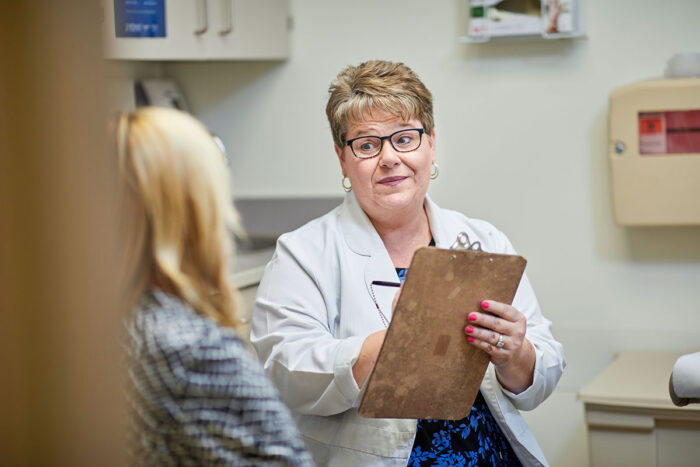More cancer patients get help to quit smoking
Siteman Cancer Center expands smoking-cessation efforts
 Matt Miller
Matt MillerCharis Baumgartner, a clinical nurse coordinator, completes a tobacco assessment of a patient at Siteman Cancer Center. A new program funded through the Cancer Moonshot Initiative has doubled the number of Siteman patients assessed for smoking, and increased by fivefold the percentage of cancer patients who smoke now taking medication to help them quit.
When patients who smoke begin cancer treatment at Siteman Cancer Center at Barnes-Jewish Hospital and Washington University School of Medicine in St. Louis — or at any of Siteman’s satellite locations — they also now receive advice about quitting smoking, referrals to easy-access smoking-cessation services and, if suitable, prescriptions for medications that aid in kicking the habit.
Those early-intervention steps are yielding promising results. When patients with cancer quit smoking, it can prolong life, and prevent recurrence and the advent of secondary cancers.
The program saw nearly twice as many cancer patients get assessed for their smoking status. In the five months before the program launched, some 48% of the more than 34,000 patients treated at Siteman were asked whether they smoked. This compares with 90% of the more than 24,000 patients who were asked if they smoked in the five months after the program began.
The percentage of patients referred to treatment also increased. In the five months before launch, only .72% of smokers were referred to behavioral counseling, and only 3% were prescribed medication to help them quit. In the months after the program began, the percentage referred to counseling nearly tripled to 1.91%, and the percentage of smokers prescribed medication to help them quit increased almost fivefold to 17%.
The results are published July 17 in the journal Translational Behavioral Medicine.
“This is a paradigm shift from the more traditional approach, in which we would refer cancer patients to specialists and hope these very sick patients would find the time, the motivation and the transportation to get help from such a specialist,” said first author Alex T. Ramsey, PhD, an assistant professor of psychiatry. “Helping cancer patients quit smoking is one of the most important things we can do. So it’s important we provide smoking-cessation treatment in ways our patients can take advantage of.”
The new Siteman program, available on the Washington University Medical Campus and at Siteman locations in West County, St. Charles County, South County, North County and in Illinois, is funded through the National Cancer Institute’s Cancer Center Cessation Initiative. In 2018, School of Medicine researchers received a grant to fund the interventional approach as part of the Cancer Moonshot Initiative. The key goal of the grant has been to develop strategies to reduce smoking among cancer patients.
When the program was launched in 2018, the smoking rate among adults in Missouri was 22%; in Illinois, the rate was 16%. But among patients from those two states who were treated at Siteman, 23% were smokers.
Ramsey said it’s too early to tell how many of the smokers in the program have kicked the habit. It’s also not possible to tell yet which specific approaches to quitting work best.
“It takes most people several attempts before they quit smoking successfully,” he said. “The key now is to keep providing opportunities to quit and offering new approaches when a quit attempt fails. Our next step will be to go back and look at which types of treatment work best.”
The key, according to the project’s principal investigator, Li-Shiun Chen, MD, is to remind patients and doctors that even very sick cancer patients can improve their health if they quit or cut back on tobacco use.
“Quitting smoking ensures the best treatment outcomes for people with cancer,” said Chen, an associate professor of psychiatry and a research member at Siteman. “Our idea is to find out which patients are smokers and to offer assistance to every single one of them.”
Chen and Ramsey expect that as the months and years pass, and more people get medication or counseling to help them quit, the number of ex-smokers seen at Siteman will rise, and outcomes for those patients will improve. Now, however, the program is in its infancy, Ramsey said.
“It’s very promising, but it’s only a first step,” he said. “We doubled assessment rates, and we saw five times more people taking medication to stop smoking. On the other hand, the absolute numbers are still smaller than we’d like. But this study assessed the first five months of the program, and we’re continuing to improve and extend our ability to reach more patients. I think that bringing this treatment support to clinics and hospital settings, at a time when patients are highly motivated to quit smoking, is going to pay big dividends.”
The researchers benefited from a new electronic medical records system in launching the program. Using that same system, they plan to continue expanding their efforts to assess and treat patients at Siteman, and to expand their efforts to other clinics on the Medical Campus.







